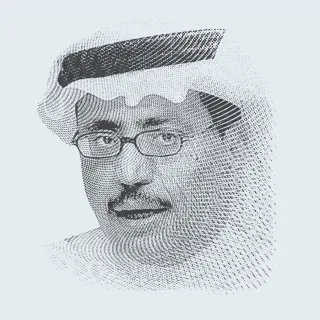Some view economics as a rigid mathematical science, whether in classrooms at schools and universities or in practical applications. This perspective stems from the discipline’s reliance on theoretical frameworks. Others, however, regard it as a more human-centered field, where rules are difficult to standardize, and where real-world implementation often diverges from textbook models. The author leans toward the latter view, emphasizing that even the most thorough feasibility studies may overlook unforeseen elements once a project is executed in reality. n nOn one hand, economists and business professionals often appear strictly serious during negotiations or work settings, projecting an image of formality. Yet behind this facade, the economic community shares the same blend of seriousness, humor, and lighthearted moments found in any social circle. One anecdote involves Saudi entrepreneur Ahmed bin Hamad Al-Saeed. After earning a master’s degree in the United States, he became fascinated with fast-food restaurants and decided to introduce the concept to Saudi Arabia. He began setting up the first Hardee’s franchise in Riyadh. Out of respect, he informed his father-in-law, Saleh bin Sulaiman Al-Amri—may God have mercy on him—a respected educator passionate about knowledge—about his plan to open a sandwich restaurant. n nUpon hearing the news, his father-in-law responded, “A master’s degree, and in the end, a sandwich shop!” n nThe story doesn’t end there. Al-Saeed recalls that both his mother and wife were privately worried about the venture’s failure, though they didn’t express it openly. After two weeks of operation, the outlet saw unprecedented customer turnout. He took his mother and wife to see the long queues waiting for meals. That modest beginning eventually grew into a major enterprise with branches across Saudi cities and parts of the Gulf region. n nAnother story features Saudi businessman Ibrahim bin Mohammed Al-Saeidan. As he climbed the early rungs of the real estate ladder, he used to distribute paper flyers outside mosques advertising residential land plots of 500 square meters, available on easy installment plans, noting that some utilities had already reached the area. One day, upon opening his office door, he found his flyer attached with a humorous note quoting a famous line from singer Najat Al-Saghira: “No, no, don’t lie!” n nThe final anecdote involves the late Saudi businessman Saleh bin Abdulaziz Al-Rajhi. During an interview with Al-Yamama magazine, then edited by Dr. Fahd Araabi Al-Harthy, promotional headlines were released ahead of publication, including one that read: “Saleh Al-Rajhi: I own a fleet of airplanes.” The public eagerly awaited the issue, only to find the magazine asking him directly: “Do you own a private plane?” His reply was witty: “I do have a fleet of airplanes—I can buy a ticket from Saudi Airlines and travel anywhere I want. That’s my fleet!” n
— news from \”الشرق الأوسط\”n
— News Original —n
title: طرائف الاقتصاديينn
content: البعض يرى أن عِلم الاقتصاد علم رياضي جامد، سواء أكان ذلك في قاعات الدرس في المدارس والجامعات وغيرها، أم في ميدان العمل. ذلك أنه مبني على النظريات، والبعض الآخر يراه علماً إنسانياً يصعب وضع القواعد له، أو بالأحرى إن بعض قواعده لا تنطبق في ميدان العمل 100 في المائة، وأنا أميل إلى أنه علم إنساني يصعب ضبط قواعده، فمهما اجتهدت في دراسة الجدوى لمشروع معين، فستجد أثناء التطبيق على أرض الواقع أن هناك جوانب لم تستطع الدراسة الإحاطة بها. n nهذا من جانب. أما الجانب الآخر فالاقتصاديون يظهرون أثناء العمل أو التفاوض جادين بشكل صارم، هذا ما يظهر للناس، ولكن واقع الحال، أن المجتمع الاقتصادي مجتمع إنساني يسوده ما يسود المجتمعات الأخرى من الجدّ والهزل والطرفة والنكتة. ولنبدأ مع رجل الأعمال السعودي أحمد بن حمد السعيد، يقول السعيد: «حينما تخرجت في الولايات المتحدة الأميركية بدرجة الماجستير، استهوتني مطاعم الأكلات السريعة، فقررت أن أنقل التجربة للسعودية، وبدأت بتجهيز أول مطعم لـ(هرفي) في الرياض، ومن باب الأدب والذوق ذهبت لوالد زوجتي صالح بن سليمان العمري رحمه الله، وهو رجل تربوي وشغوف بالعلم، وأخبرته بنيتي فتح مطعم أكلات سريعة، يعني ساندويشات». ويستطرد السعيد قائلاً: «حينما أنهيت حديثي، أجابني والد زوجتي ماجستير، وآخر الأمر مطعم ساندويشات!». n nلم ينتهِ الأمر عند هذا الحد، بل إن والدته وزوجته كانتا خائفتين من فشل المشروع، وإن لم يظهرا هذا علناً. يستطرد السعيد: «وبعد الافتتاح ومرور أسبوعين، شهد الفرع إقبالاً منقطع النظير، فصحبت والدتي وزوجتي لتشاهدا الطابور المصطف للحصول على وجبة، لتنشأ بعد ذلك شركة كبرى تتوزع فروعها في جميع مدن السعودية، وبعض دول الخليج». n nثم نأتي لرجل الأعمال السعودي إبراهيم بن محمد السعيدان، يقول السعيدان: «بعد أن صعدت أولى درجات سلم تجارة العقار، كنت أوزع إعلاناً ورقياً أمام أبواب المساجد، وكان مضمون الإعلان بيع قطع أراضٍ سكنية، مساحتها 500 متر مربع، وبالأقساط المريحة جداً، مع ذكر أن بعض الخدمات وصلت للحي، لأتفاجأ ذات يوم، وأنا أفتح باب مكتبي بورقة الإعلان، وقد علق عليها أحد الظرفاء بأغنية نجاة الصغيرة (لا لا تكذبي)!». n nونأتي أخيراً لرجل الأعمال السعودي صالح بن عبد العزيز الراجحي رحمه الله، الذي أجرت معه مجلة اليمامة السعودية، حينما كان يرأس تحريرها في ذلك الوقت الدكتور فهد عرابي الحارثي، وكانت واسعة الانتشار في السعودية، لقاءً صحافياً، ووضعت المجلة عناوين ترويجية للمقابلة مع الراجحي في الصحف المحلية. ومن ضمنها: «صالح الراجحي: أملك أسطولاً من الطائرات». ليترقب المجتمع صدور المجلة، ولتتخاطفها الأيدي، ليجد القراء سؤالاً من المجلة؛ هل لديك طائرة خاصة؟ وكان جواب الراجحي: «أملك أسطولاً من الطائرات، فأنا أستطيع أن أشتري تذكرة من الخطوط الجوية السعودية، وأذهب لأي مكان، وهذا هو أسطولي!». n nوأخيراً، في رأيكم… هل علم الاقتصاد علم رياضي أم إنساني؟ ودمتم.
